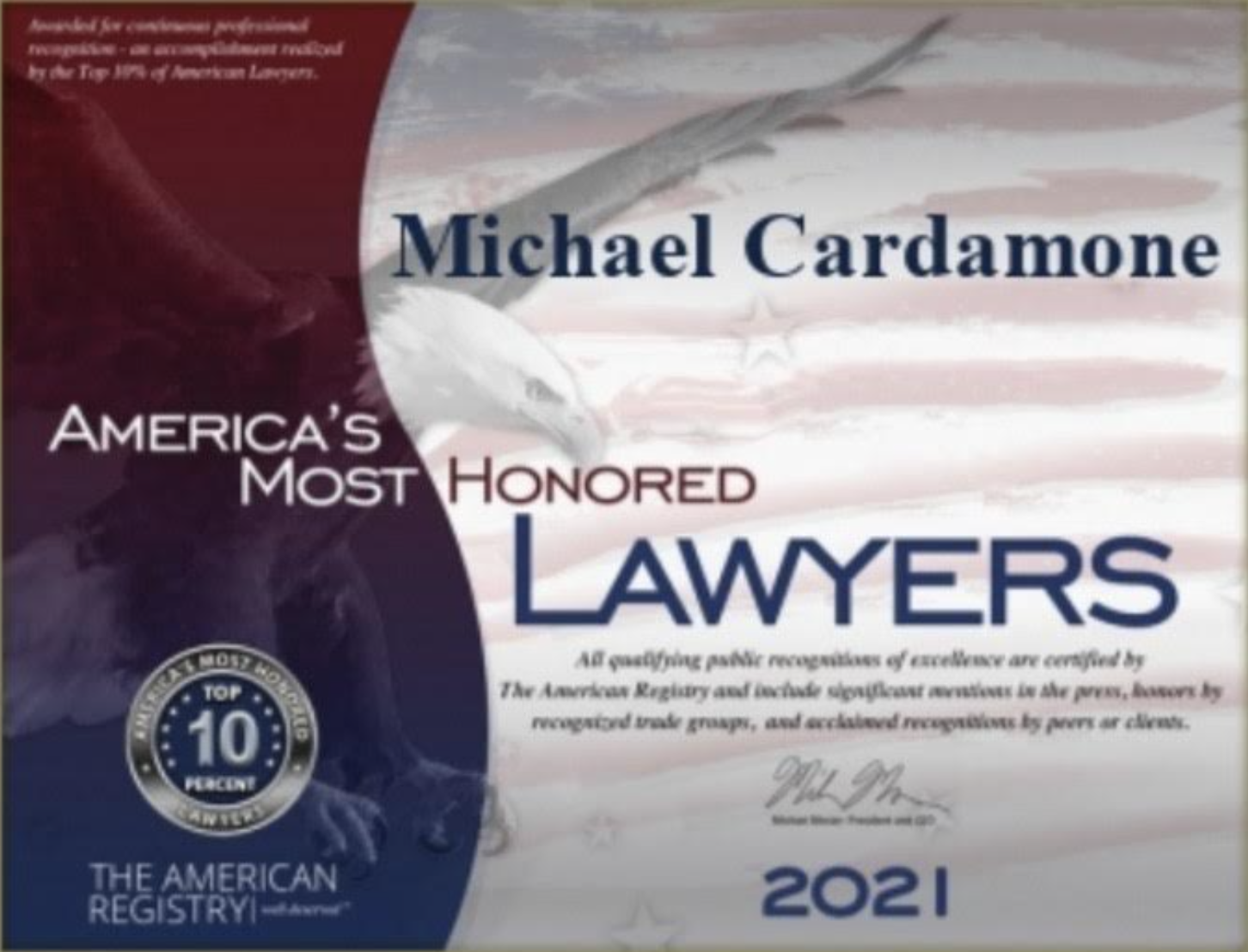During a work injury case, the ideal conclusion is to reach a settlement or a compromise that mutually benefits both parties. Nobody wants the case to drag on in court. The injured employee wants quick recovery with reasonable benefits while employers want it settled because haggling over what an injured worker should get is not a good look for them.
Yet, things don’t always go as planned and negotiations can sometimes stall.
Injured workers in Pennsylvania usually come to us to find out how their case will proceed if no agreement can be reached. The simple answer is, if a case doesn’t settle by way of a Stipulation, or a Compromise and Release Agreement, then a Workers’ Compensation Judge will intervene and decide the issues at hand.

Image Source: Pexels.com/EKATERINA BOLOVTSOVA
How Do They Do This? Let’s Find Out.
1. Briefings Will Be Filed
The Pennsylvania Workers’ Compensation Judge will admit evidence into the record. Then, in many cases, at a final hearing, the Work Comp Judge will issue a Briefing Schedule.
Briefs are the written arguments from each party’s attorney. The Brief will include a summary of the facts, the relevant Pennsylvania Workers’ Compensation law, regulation, or case law, and an argument section.
Normally, the moving party — the party that instigated litigation — will have to submit their brief first. It usually happens 45 to 60 days after the final hearing. Then the other side will generally have 30 to 45 days thereafter to submit their brief. Although, sometimes, the briefs are due at the same time. This will depend on the particular Work Comp Judge and what the attorneys ask for.
If it’s a Claim Petition and no benefits are being paid, this lengthy time period after litigation ends. Now, parties wait to receive a decision, and this waiting period can be quite frustrating. Conversely, if an injured worker is already receiving wage loss benefits, this lengthy process is helpful as the benefits continue at least until the decision comes out.
2. Credibility Decisions Will Be Made
The Pennsylvania Work Comp Judge will have to make credibility determinations about each witness. Which witness the Judge found most credible and why. These witnesses may include people who witnessed the accident — strangers on the road or other workers in the office. It may also be the company’s safety inspector who vouch for the safety practices in the building.
Usually, however, especially in cases where the injury or its extent is disputed, medical experts emerge as the most influential witnesses in the work comp case.
The Work Comp Judge will decide about issues relating to the medical evidence presented by both parties. The Judge may ask the medical experts things like whether the worker has recovered, whether the worker sustained a work-related injury, whether the worker has an earning power, etc.
When making decisions about witness’ credibility, you will find a paragraph wherein the Judge states “I find the opinions of Dr.___ to be more credible than Dr.____ “, and then list the reasons why. In most cases, there are about 3 to 4 more sentences explaining why the Judge found one doctor more credible than the other.
3. The Decision Will Be Given
A written decision, including the important Court Order, will be mailed to the parties around 30 to 60 days after the last brief is submitted. Here, again, each Judge is different with respect to the turnaround time.
While the decision usually isn’t delayed more than the 60 days maximum but this isn’t written in stone. If your decision is still not out after 60 days have passed, your PA work comp lawyer will get in touch with you and update you with the latest developments.
The Decision will list the Findings of Fact, Conclusions of Law, and a Court Order. The court order will contain the instructions of the Judge regarding the decision of the case and how each party is supposed to proceed from there on out.
The Importance Of Credible Medical Experts
Medical evidence is often the key element to a petition that’s being litigated before a Pennsylvania Work Comp Judge. And, this is a big reason why injured workers need a lawyer. An average worker won’t know how to depose the medical doctor or how to prepare them. To begin with, most perhaps won’t even know how to get in touch with a credible doctor with relevant expertise required for a particular case.
Plus, oftentimes an injured worker won’t be able to afford the $1500 to $6,000 deposition fee of the doctor.
As you can see, there can be a real disparity here, but it arises from the specialties a doctor has to offer — from a regular physician to an expert neurosurgeon or orthopedic surgeon, for example.
To counter all that, our firm has a high winning percentage and a big reason is that we send our clients to reputable physicians. We have the fighting power and the financial leverage to go after big corporations that are denying your rightful injury compensation.
So, if you are looking for a strong legal representation in your work comp case, you’ve come to the right place.
Can The Decision Of The Judge Be Appealed?
Can the Decision of the Workers’ Compensation Judge — often referred to as WCJ — be appealed?
Yes, there is a 20 day appeal period to file, which takes the cases to the Pennsylvania Workers’ Compensation Appeal Board. That Decision can then be appealed to the Commonwealth Court of Pennsylvania. After that, the PA Supreme Court will take some cases depending on the issue.
So, even if a WCJ doesn’t rule in your favor on the first try, all the doors aren’t closed to you. With the right workers comp attorney on your side, someone with a fighting spirit, you can rest assured that your rights will be appealed and fought for, till you get the rightful dues that you are owed.
For more information about Pennsylvania Workers’ Compensation law, call us anytime at 215-206-9068. Remember: All We Do Is Work Comp.
The PA Workers’ Compensation Board receives thousands of injury claims every year. To ensure each case is determined on its merit and all injured workers are given their due compensation, the board and the system work diligently.
Yet, there are things that may slip through the holes and some gaps may remain in the justice system. To correct that, a dedicated PA work injury lawyer employs some battle-hardened rules in every case to ensure a highly favorable settlement in the favor of their clients. As we are Pennsylvania’s rarest, most dedicated law facility for injured workers, we pride ourselves in perfecting these best practices that always help us give our best to the clients.

Image Source: unsplash/Josue Isai Ramos Figueroa
On your part too, there are things you can do to give your lawyers the best fighting chance. In this article, we’ll share 6 things that we always ask our clients to do. Things that don’t cost you anything, and give us what we need to get to the victory flag.
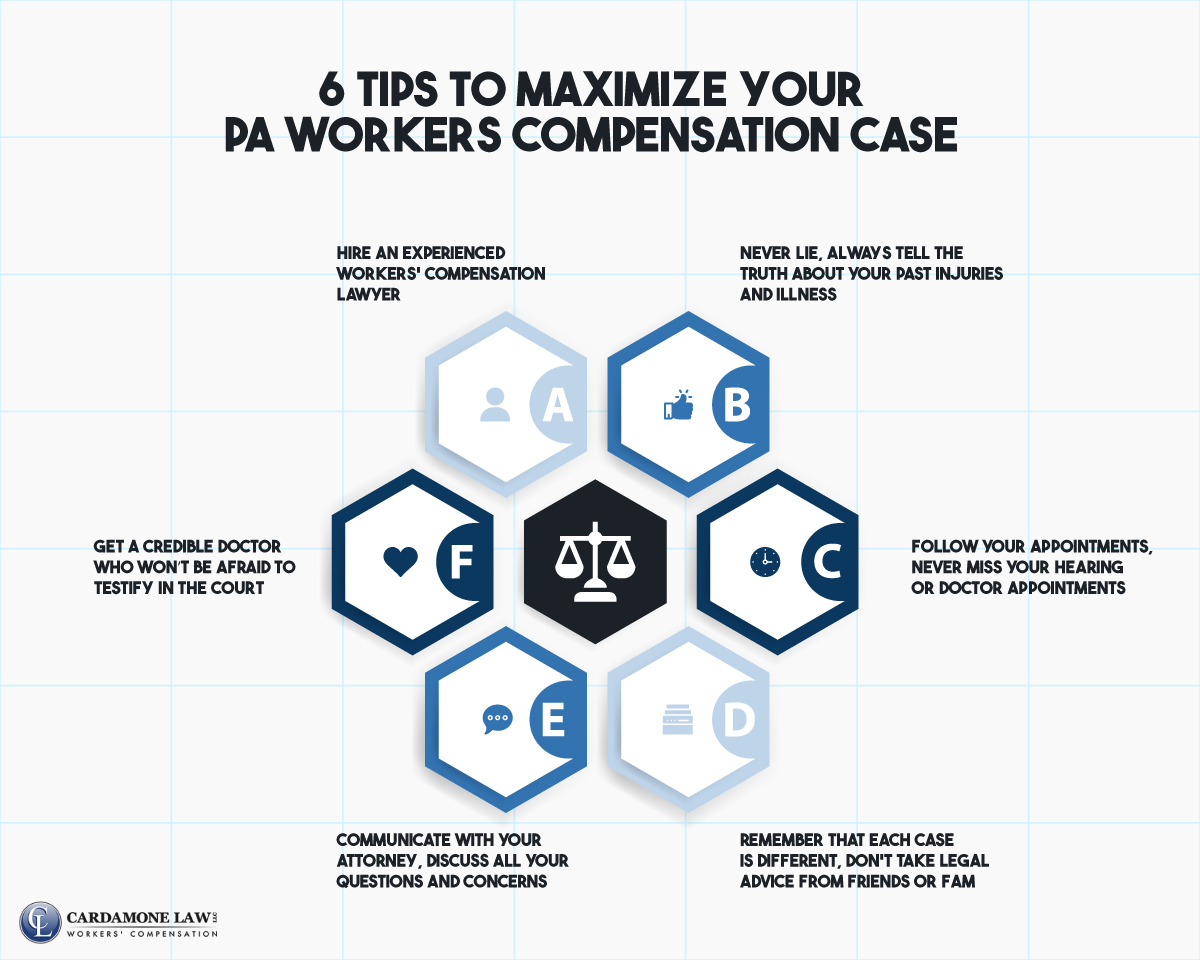
Tip #1: Hire Cardamone Law
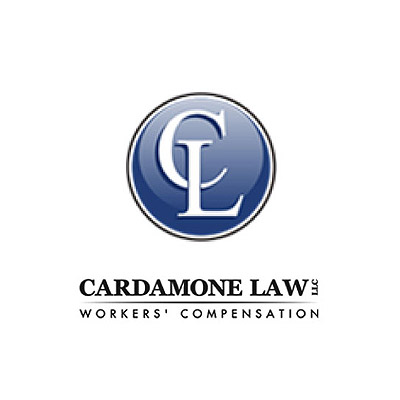
First things first: Hire Cardamone Law!
Work Comp for injured workers is all we do. We’re rare, small, focused, and financially leveraged to take down any employer or insurer in court. No firm can guarantee victory — that’s not ethical. But you can do your research to see what firms solely focus on Pennsylvania Work Comp and what their reputation is. You have the right to proceed “pro se” — representing yourself — but it’s highly discouraged and makes it very difficult to succeed. The earlier an injured worker lawyers up, the better they do overall.
Tip #2: Always tell the truth

Image: Photo by Brett Jordan on Pexels
Tell the truth at all costs. Don’t hide prior injuries and spend time to remember past accidents, injuries, or work comp claims — you will be asked about them. If you are afraid that reporting an earlier injury or illness may harm your chances for compensation for the current injury, don’t worry. An aggravation of a prior condition is a viable work injury!
But if you deny prior accidents, or forget, you can rest assured that the other lawyer will try to make you look like a liar. That’s their job — to attack your credibility to save their client money. So whether it’s the doctor, judge, or lawyers, always tell it like it is — period.
Tip #3: Get a credible doctor who won’t be afraid to testify

Image: Photo by Karolina Grabowska on Pexels
Make sure your doctor is advocating for you. That’s where we, the lawyers, come especially handy: to make sure you’re seeing a reputable doctor who isn’t afraid to testify.
Many are afraid. Some don’t take work comp for payment. So, sometimes the options for a credible doctor aren’t as good as you’d suspect. To make sure we have a good doctor on our team, we will get their records and read them and make sure they are listening to you and your complaints — and not blaming everything on “arthritis” like the defense medical doctors love to do.
Having a credible doctor vouching for your injuries is important especially if you have an independent medical exam coming up too. If both doctor’s accounts align closely, you can get that much closer to a great conclusion.
Because remember, without strong medical evidence, it’s nearly impossible to win.
Tip #4: Follow your appointments

Image: Photo by Pixabay
Attend the hearings, mediations, and doctor appointments that you are told you must attend — don’t blow them off. Listen to your lawyer as to when you need to participate in an event, and when you’re excused. (ie, some hearings are just for the lawyers).
Come on time and don’t keep people waiting. The more professionally you behave, the easier you make it for the judge and the board to listen to you with more patience and respect.
Also, please dress appropriately — even if the hearing is via video. It’s a court proceeding and you must be respectful. Shower, wear clean clothes, and a confident demeanor. Remember, if you show up looking like you don’t care, the others may return the sentiment.
Tip #5: Communicate with your attorney

Image: Photo by Alex Andrews on Pexels
Forthright and regular communication with your attorney will be critical for the case. Tell them if you’re interested in returning to work, with the current employer or another one. Tell them if you are feeling recovered or close to it. Tell them if you got papers in the mail and aren’t sure what they mean.
The more you communicate, the better. This doesn’t mean sending 3 am texts every day. But, be in touch frequently to maximize the winning potential for your case.
Tip #6: Remember that each case is different

Image: Photo by Oleksandr Pidvalnyi on Pexels
Finally, don’t get legal advice from your doctor or a neighbor. Your case is different than all others. Trust in the lawyer you hired and their expertise- unless they don’t communicate with you or behave inappropriately of course. There isn’t a magic number for a given case to settle at- each is unique. But a case will have a realistic range for settlement. Realistic doesn’t mean what you want, or how much you need to pay off your house. The value is based on other factors like your comp rate, extent of injury, age, educational level, and many other factors. To settle a case, both sides need to compromise- remember that.
Disclaimer:
Nothing on this blog/site shall be construed to be legal advice for your facts and case. You need to sign a Fee Agreement with our firm to be entitled to specific advice in your case. Fees in Pennsylvania Workers’ Compensation cases are contingent — we only get paid if we win a petition or settle the case.
Pennsylvania Workers’ Comp Attorney
Under the Pennsylvania Workers’ Compensation Act, if your work causes you any injury or illness, you are entitled to receive payment for your medical expenses and lost wages. In case the injury or illness is fatal, your dependents receive the death benefits.
But things aren’t this simple.
Sometimes, employers and their insurance carriers refuse to pay the compensation you are asking for. Other times, preexisting conditions come to the surface that might make your workers’ compensation case weaker. And what if your work injury does not take place at work but on the way to work? Does that count as grounds for compensation?
To travel through this maze and have the best protection that the Pennsylvania Workers’ Compensation Act can provide, you need a competent lawyer. But a healthy bit of homework never hurt anybody.
The more you know about the Workers’ Compensation Act, the better prepared you’ll be for what’s to come.
So, here are 7 critical things you must know when you suffer a workplace injury.
(Almost) All Pennsylvania Workers are Covered by the PA Work Comp Act
All Pennsylvania employees – barring a few exceptions – are covered by the Act. This includes all companies including nonprofit corporations and unincorporated businesses, too. Even if you are the sole employee at your company, you are covered under the workers’ comp Act.
Some employees who may not be covered under this Act include:
- Federal civilian employees (they are covered by other compensation systems)
- Volunteer workers
- Agricultural workers
- Railroad workers
- Shipyard workers, and
- Casual employees.
For a complete list of workers who may not be covered under this Act, please visit the Department of Labor & Industry website. Or take a look at this handy document for a quick review of Pennsylvania Workers’ Compensation Act.
Your Work Comp Coverage Starts on the Date You Get Hired
However, for timely receiving of benefits, reporting the injury/illness promptly to your employer is critical. If you delay it too long, you run the risk of employer/insurer refusing to accept your claim or compensation.
If that happens, you will need a workers’ compensation lawyer to properly file a claim petition with the Workers’ Compensation Bureau.
(Almost) All Injuries and Illnesses are Covered by the PA Work Comp Act
The Act is highly comprehensive in its intention to provide the full might of law to the injured/ill worker. The only two instances where the Act may fail to cover you are when the injury or illness is:
- Self-inflicted, or
- Due to the violation of law (including intoxication or drug use, etc.)
(note also there is a defense called a Violation of a Positive Work Order)
In such cases, no workers’ compensation will be provided to the injured employee.
The Act Offers Several Compensation Benefits
There are four key benefits that are provided under this Act:
- Medical Expenses: payment of medical expenses such as medicine, surgery, hospital stay, and other treatments.
- Lost Wages: monetary compensation in case of complete or partial disability where you either can’t work or the work pays less than your pre-injury wages.
- Death Benefits: paid to your dependents.
- Specific Loss Benefits: a specific loss award for permanent loss of all or part of your sight, hearing, arm, and leg, etc., or some serious disfigurement to your head, face, or neck.
The best workers’ compensation attorneys who are specialized in the field can help maximize these benefits for you.
Notify Your Employer Instantly to Be Eligible for Compensation
First of all, notify your employer immediately – within 21 days of the injury/illness to be precise. If 120 days pass and you fail to inform your employer of your injury, no compensation is allowed. Please remember that unless the notice is given, or your employer already knows about your injury, no benefits are allowed. You can only receive wage loss benefits once you report the injury if the claim gets accepted.
So, report your injury timely. Once you do that, your employer is required by law to file a compensation claim with their carrier for the benefits to start coming in. Your employer or their insurance carrier have to the right to accept or deny your claim within 21 days.
To safeguard your benefits, the smartest thing is to hire a workers’ compensation lawyer (or at least consult with one) as soon as you can after you suffer the injury.
You Can Choose Your Own Healthcare Provider From a Given List
Your employer will give you a list of six or more physicians or healthcare providers that you can consult with for your treatment. You can choose provider from that list; your employer cannot force you to visit anyone in particular.
For the first 90 days, you can only get treatment from a provider from the list. After the 90 days, you are free to visit a consultant of your choice provided you notify your employer of the physician you have chosen. Your employer and their insurance carrier have the right to receive monthly lists from your healthcare provider.
In cases where no list of physicians is provided by your employer, you can get treatment from anyone, and your employer or their insurer will cover the medical costs.
However, if you go to a provider of your choice within the initial 90 days, your employer or their insurer may refuse to cover that bill.
You Must Work Within the Time Limits as per the Pennsylvania WC Act
While the law is pretty sympathetic to the injured worker, there are time limits that need to be followed to keep everything running smoothly. With the help of a competent Philadelphia workers’ comp attorney, you can easily keep ahead of all the timelines, and everything that comes with it.
Some of the important time limits to keep in mind include:
- Employer must be notified of the injury within 21 days of the incident, and no later than 120 days for the allowance of compensation.
- You have three years (from the date of incident) to file a claim petition if your compensation benefits are denied by your employer or their insurer.
- Your employer and their insurance provider have 21 days to accept or deny your claim.
- In case of occupational illness, you have 300-weeks from the time you were last exposed to the hazardous element/chemical to file for your compensation claim.
- For the first 90 days of your injury, you have to visit a healthcare provider of your employer’s choosing. After the 90 days are up, you can go to any physician that you want and your employer will foot the bill. There are some exceptions to this so speak to a workers’ compensation lawyer as soon as possible.
Call Cardamone Law Today to Make Your Workers’ Compensation Journey an Easier One
The information we have shared here today is only so you can be prepared to deal with the many ups and downs that come your way when you file a workers’ compensation claim. Before you start to feel overwhelmed, though, know that at Cardamone Law, you are in best hands. We have fought and settled hundreds of workers’ comp cases and helped secure our clients millions of dollar in settlements.

Under Michael Cardamone, all of us are trained to go after the big guys every day. This is what we do. And we are pretty good at it.
If you or a loved one has suffered a workplace injury or illness, give us a call today for free consultation. In this no-obligation meeting, we’ll discuss the details of the case and suggest you the most helpful course of action.
The best Pennsylvania Workers’ Compensation Lawyers are 24/7 available at (215) 206-9068 or drop an email directly to Michael Cardamone at Michael@CardamoneLaw.com
Our courts in Pennsylvania have held that an injury must be “in the course of” employment. An employee hurts their back lifting a heavy box at work – this is clearly in the course of employment. A nurse hurts her shoulder when a patient falls off balance – this is clearly in the course of employment. But there are situations where the actual manifestation of the injury need not occur in the course of employment. One of these situations include circumstances or factors causing the injury to occur in the course of employment even if the actual injury doesn’t.

Image Source: unsplash/Christin Hume
This can arise in a heart attack situation where a claimant sustains a myocardial infarction that had the onset at home or elsewhere – but not at work.
The Case that Set the Precedent
Krawchuk vs. Philadelphia Electric Co., 439 A.2d 627 (Pa. 1981).
The details of the case go something like this.
“At the time of his death, Claimant’s decedent was working under great and unusual stress stemming from the work he was doing in connection with a special project known as “PMS4?, and a treatise he was to deliver, on behalf of his employer, in California a few days later (9). In addition to the special project and other duties, Claimant’s decedent had also been working for several weeks on the preparation of a treatise to be delivered in California (10). All of the above activities constituted additional and unusual exertion on the part of Claimant’s decedent, arising from and related to his employment (11). On the day prior to the heart attack, Claimant’s decedent was examined by Dr. Albert J. Kraft, who, at that time, found the Claimant’s decedent to appear tired and under great stress due to his added work load. *118 (12).

For five hours prior to the heart attack, Claimant’s decedent had been working at his home on the treatise which he was to deliver on behalf of his employer at a convention to be held in California a few days thereafter (13). Dr. Kraft, a cardiology specialist, testified as to a causal relationship between the stress occasioned by Claimant’s decedent’s heavy work load and the fatal coronary, which he sustained on May 10, 1973; and stated unequivocally that there was a causal relationship between the stressful events concerned with the decedent’s work and his death from myocardial infarction.
(Notes of Testimony, 10/21/74, pages 16 and 17). (Emphasis added).”
What Does the Case Prove?
The court found that in certain circumstances, to establish ‘course of employment’ it is not necessary for the actual injury to take place during the actual work.
In this case, for example, while the heart attack itself didn’t happen at work, the events causing it were work-related, according to the Judge. Krawchuk has since been followed by the Commonwealth Court of Pennsylvania.
Bottom Line:
Think about it. This makes absolute sense. The place where the symptoms are experienced or felt, doesn’t necessary have to be at work – but if the work activities caused the symptoms, it can be a work – related injury nevertheless.
Philadelphia Work Comp Law Firm
After a year of litigation before a Work Comp Judge in Malvern, PA, our firm secured a victory for our client- a hardworking nurse who is an immigrant, who injured her shoulder and foot at work. She continued to work with restrictions but the Employer/Insurer claimed she was “fully recovered” after seeing their handpicked IME doctor. We fought back and also filed a Petition to Review, seeking refinement of the work-related diagnoses. We prevailed on both petitions. The WCJ found our client credible, and our medical experts more credible than the IME doctor. The Decision from the Judge was well reasoned and about 13 pages long- reviewing the evidence, the law, and the findings. The WCJ selected our Objective Summary of the Evidence and incorporated it into the Decision.

Image Source: unsplash/Brandon Holmes
We are a tenacious firm with Attorneys Cardamone and Silver analyzing every case together- over 65 years of Pennsylvania Work Comp experience. We don’t hand our files off to a new attorney for every hearing. We’re small but well leveraged financially, so we can compete with any firm in any case. In fact, our opponent was a member of a 100 attorney law firm. It doesn’t matter who we go up against- we fear no one and win the vast majority of our cases.
Call us any time for a free review of your Work Comp case- it’s all we do!
Cardamone Law University, our firm’s podcast for injured workers, is currently ranked 5th in the nation by FeedSpot! We aim to put out regular content, that’s easy to understand, and that’s not too long-winded. We realize many people don’t have 60 minutes to listen to a lawyer speak. So we produce short pieces on specific topics that you may want to learn about.
Here is a link to Cardamone Law University podcasts, which can be seen on many sites: https://open.spotify.com/show/2f7aZRO93yOFYt4y3dc4ix
If you wish to access the podcasts through our website, click here: https://www.myphillyworkerscomp.com/cardamone-law-university/

Image Source: unsplash/Jukka Aalho
Thanks for your support!
Montgomery County, PA Injury Lawyers
It depends. Commuting is generally not in the course and scope of employment and therefore isn’t considered a work injury if you’re injured while commuting. But if you are a traveling employee, it may be a work-related injury. A Philadelphia car accident attorney will be able to guide you for your exact case. However, below is a brief guide to help you about PA car accidents and when to call a workers’ compensation lawyer.
Is Car Accident on My Way To Work A Work Comp Case?
Like most things legal, there is no straight answer here. There are some variables to look at first. In most cases, your commute isn’t a part of your course/scope of employment. Therefore, if you are in an accident while driving or traveling to work, you aren’t eligible to apply for a workers’ compensation case for a car accident injury.
But this is where things get interesting (or complicated, depending on how you look at it). Even though you can’t file for work comp for car accident during your work commute, personal injury laws can be explored and a Philadelphia car accident attorney can help you work out the details.

Image Source: unsplash/Erik Mclean
A Personal Injury Case:
These are legal situations where you suffer an injury or accident caused by another person. A personal injury case is the process through which the law holds the other person liable and instructs their insurance company to pay for your pain, medical expenses, and the psychological trauma that you suffer.
In the example we are discussing today, while a workers comp case may not apply, you can discuss with your lawyer about a possible personal injury case. If you have hired a good enough car accident lawyer in Philadelphia, they will bring any such possibility up themselves, letting you take care of the more important matter of getting better.
When Can A Work Commute Injury Result In A Workers’ Compensation Case?
While it’s true that in this exact scenario, a personal injury case may be more appropriate, there are instances when a competent PA car accident attorney should see if there is enough grounds for a workers’ compensation case.
– When you’re traveling employee:
If you work as a traveling salesman, or are you commuting for a specific task assigned to you by your work, it may be grounds for workers’ compensation in PA car accident case.
Suppose your boss told you to pick up something at Staple’s on the way in, and that’s when you were in an accident- doing a specific assignment for work, that’s enough to start building a workers’ comp case.
Do remember that there are situations when both – a workers’ comp case and a third-party personal injury case – apply. In these cases, we work with some of the best car accident PA lawyers to maximize each legal matter for the benefit of our mutual client.
Since most workers’ comp cases in Pennsylvania are time-consuming as well as time-sensitive, you can get the best out of a bad situation by reporting your case to one our PA car accident lawyers in work comp cases at your earliest. The sooner we know, the quicker we can start gathering the facts that will help us provide you a settlement that you deserve.
If you have any questions, please feel free to call or email Cardamone Law at (215) 206-9068 or Michael@CardamoneLaw.com for a free analysis of your case.
If you’re an injured worker, and you receive a document in the mail called Assignment of Petition to a Workers’ Compensation Judge, then that means either your attorney, yourself, or the employer’s attorney, filed a petition in your case. The most common petitions are: Claim Petition, Penalty Petition, Review Petition, and Termination, Suspension, or Modification Petitions. If you settled your case, then a Petition Seeking Approval of a Compromise and Release will be filed.
So what does this document mean? It just tells you which Pennsylvania Workers’ Compensation Judge will hear/decide the petitions (s) that were filed. After you receive this document, you will soon receive a Notice of Hearing. The Notice of Hearing will tell you the date, time, and location of the hearing. Note that since March 2020 to the present and ongoing, that most hearings are by video. But check the notice and speak to your attorney to be sure.

Image Source: unsplash/Sasun Bughdaryan
If there is litigation started in your case, make sure to call us if you aren’t represented. Injured workers will usually double or triple their net wage loss benefits by lawyering up- and you don’t have to send any money- it’s a contingent fee system in Pennsylvania Workers’ Compensation.
For more information about the Assignment of Petition to a Workers’ Compensation Judge, call us any time (215) 206-9068 for a free analysis of your case.
Following a work injury, and according to workers’ compensation case laws, after you deem able to work again, your employer can ask you to return to work. The new work offered could be lighter than you used to handle, with reduced hours, too. These modified work responsibilities intend to reacclimatize you to the work environment and help your transition become smoother.
However, there are cases when you cannot take on even these lighter duties.
Can your employer force you to come back to work? If you refuse, can they reduce your compensation benefits?
Not if Cardamone Law has anything to do with it!

Image Source: unsplash/Maarten van den Heuvel
The Case:
Our client was a nurse at a large Pennsylvania hospital when she injured her foot at work. The injury led to surgery and a long recovery. Due to the injury, and the subsequent healing process, it was difficult for our client to resume her usual responsibilities at work. Therefore, when she was somewhat healed, she was asked to come back to work and handle some modified tasks – a desk duty to be precise.
While the work itself was doable, our client was unable to commute due to her injury. She experienced numbness, pain, and other symptoms, and was unable to drive long distances – hence, she was unable to commute to work.

When her condition was made clear to her employer, they decided to go to litigation. Attorney Michael Cardamone, owner of Cardamone Law, a powerhouse boutique firm for injured workers, obliged.
The Verdict:
During the course of the trial, Attorney Michael Cardamone, successfully proved the seriousness of his client’s injury. It was demonstrated that while the job was doable, the travel was not.
It took 14 months of litigation, two expert medical depositions, and testimony from our client, as well as an employer witness to prove our case.
Judge Donald Poorman issued his well-reasoned Decision, denying the Petition to Modify work comp Benefits, finding that the claimant was credible, as was her doctor, in demonstrating that she was unable to get to the job due to her work-related injury.
Cardamone also successfully asserted that the accepted diagnoses should be amended to comport with the diagnoses of claimant’s treating physician, who was in a better position to render such opinions having treated claimant over a period of time.
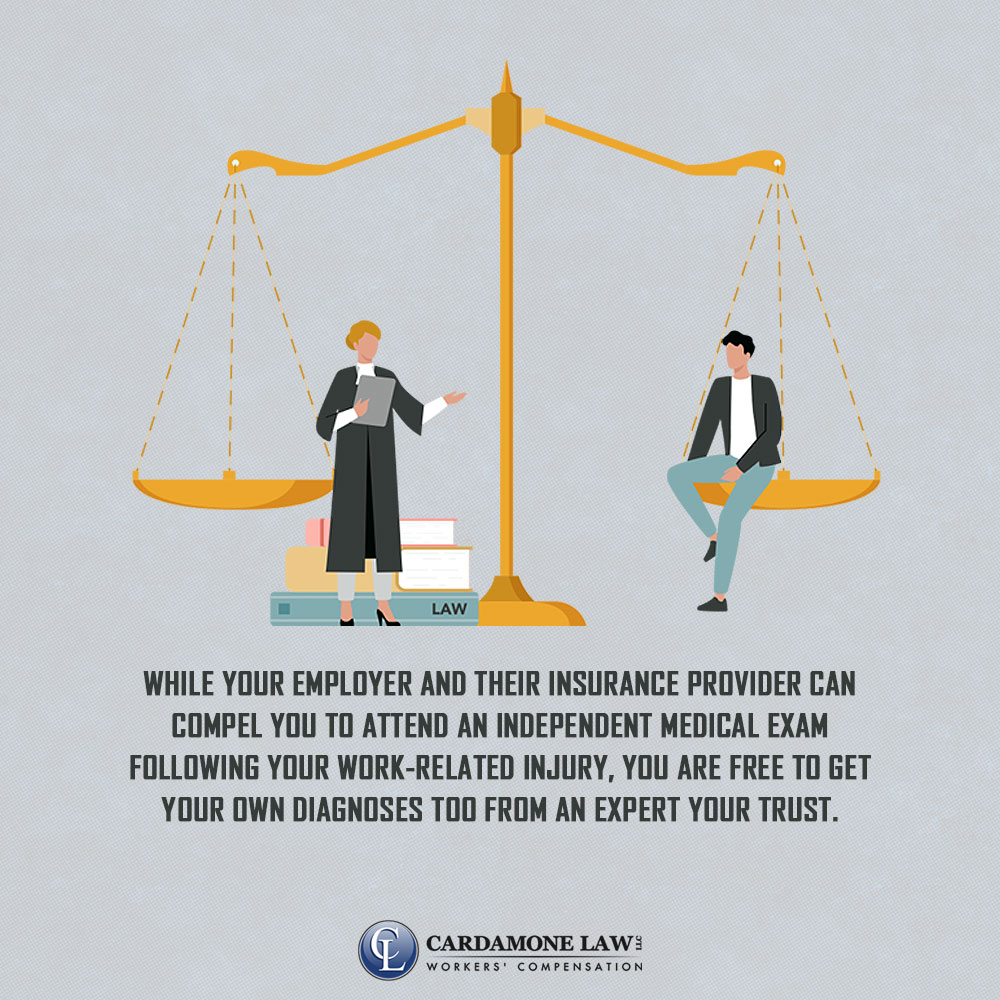
It is important to note that while your employer and their insurance provider can compel you to attend an Independent Medical Exam following your work-related injury, you are free to get your own diagnoses too from an expert your trust. If you are honest and open about your injuries and any pre-existing conditions, it’s more likely that an IME will end up in your favor. But do not do it alone. As soon as you receive a notice asking you to take an IME, lawyer up immediately.
Why Choose Cardamone Law?
You hear a lot of chatter on TV these days that “size matters”. We agree – smaller is better.
We give our cases more attention than what you’ll get from a large firm with their hands dipped in all kinds of cases and litigation. We give your case the focus it needs to see it come to fruition. We comb through each and every detail of every case. We cross our Ts and dot our Is.
We are the workers’ compensation case experts that prove that you don’t need 5 million dollars to try a case. And, we’re fully equipped financially if we do need to spend a lot of money.
Our files don’t get passed around to rookies for every event/hearing. We carefully work on our cases with our two highly experienced lawyers, and an “of counsel” lawyer. We defeated million and billion dollar companies on a routine basis.
If you are looking for Philadelphia work comp attorneys who do not shy away from a good fight, give us a call today: (215) 206-9068. We are happy to offer you a free-of-charge and free-of-obligation consultation any time.
Your favorite workers’ compensation law firm – Cardamone Law – is expanding and growing. Thanks to the mounting trust our community keeps putting in us, we are becoming ever stronger to defend you and your people in case of any injury suffered at work.
To bolster our ranks, Paul Silver, a veteran PA workers’ compensation attorney has joined our team. Silver comes with more than 40 years of Work Comp experience and is a heavy hitter. Much like Michael Cardamone, he believes in settling cases to ensure expedited relief to the clients, but he isn’t afraid to go to litigation.
Together, Cardamone and Silver bring over 65 years of combined experience in Pennsylvania work comp litigation to our boutique work comp firm.
A Brief Resume Of Paul Silver:
Attorney Paul Silver has served as the Chief of the Legal Division of Pennsylvania Bureau of Workers’ Compensation.
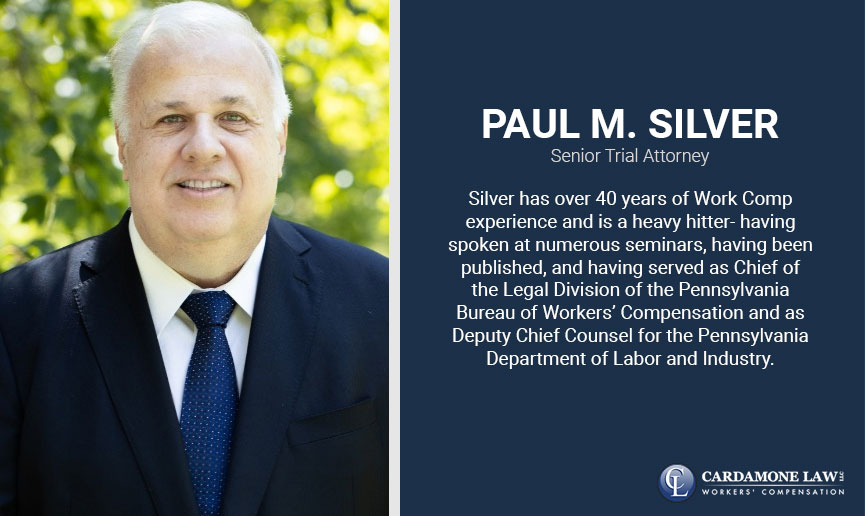
He knows the ins and outs of how workers’ compensation works in the State of Pennsylvania. He is aware of how the certain areas of the law are less directives and more guidelines, which some employers and their insurers/lawyers try to interpret with ill intent.
As the former Deputy Chief Counsel for the Pennsylvania Department of Labor and Industry, he brings a thorough knowledge of the system from both ends of the table. This comprehensive knowledge has already benefitted us immensely in our negotiations and case building.
Attorney Paul Silver is also a gifted speaker and a published author.
Call Us Today
If you are a loved one has suffered a workplace injury or illness, the smartest thing to do is call your lawyer immediately. If you don’t have a lawyer, give us a call so we can discuss the details of your case with zero fees and no obligation to hire us.
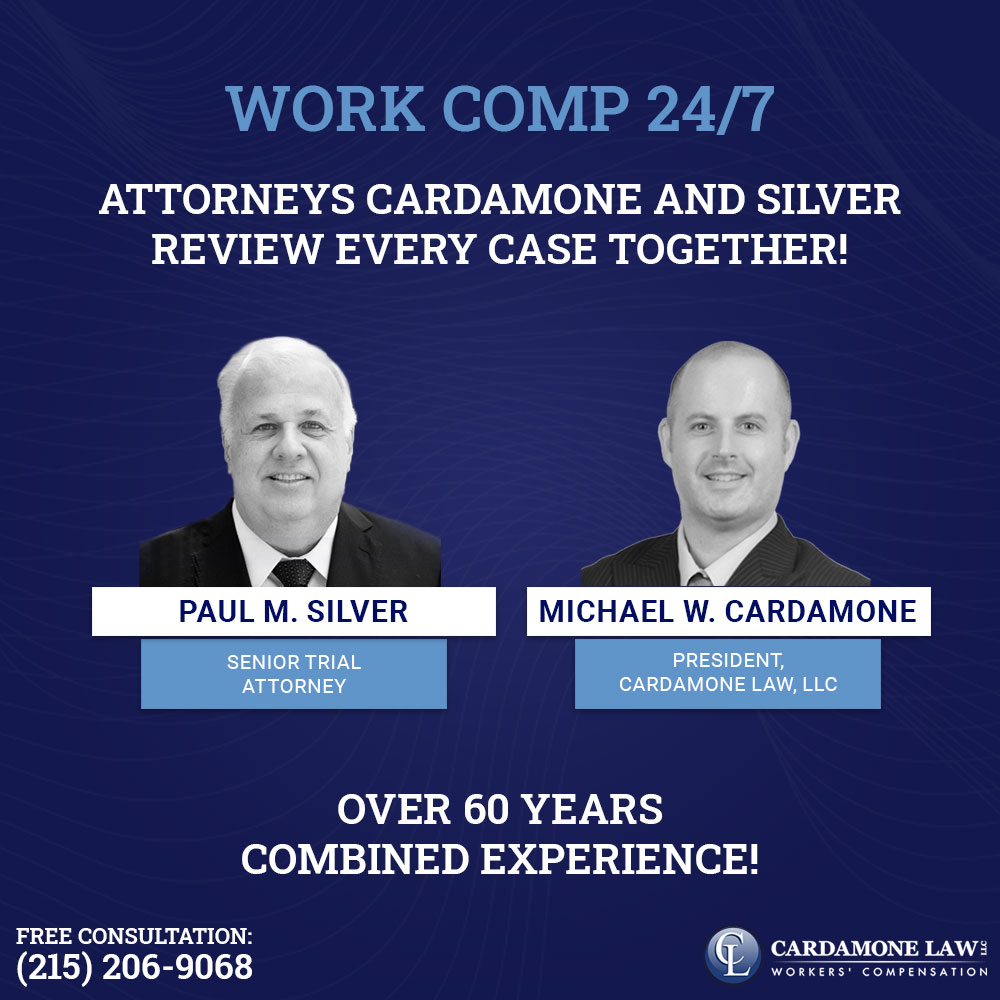
Though workers’ compensation cases are supposed to be straightforward, any disagreements can arise any time, leaving you exposed and vulnerable. The mere fact that your employer and their insurance provider will come with the full might of their highly-paid lawyers means that you should not go into any negotiations with them without lawyering up first.
Give a Philadelphia Workers’ Comp Attorney a call today – it’s free: (215) 206-9068















